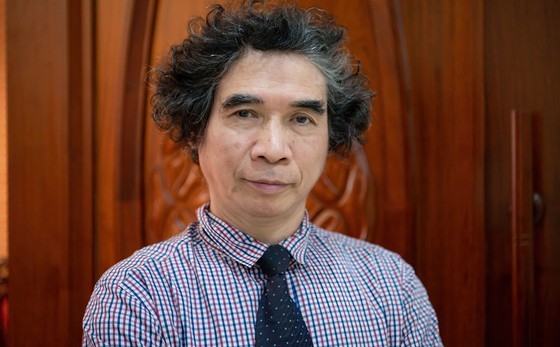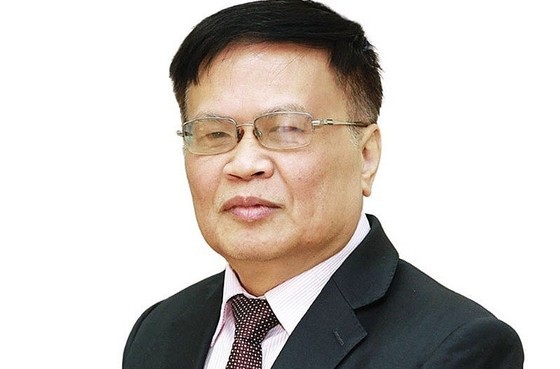 |
Illustrative image. (Photo: SGGP) |
Assoc. Prof – Dr. Nguyen Thuong Lang, National Economics University: Interest rates were increased too urgently
 |
Vietnam has only seen signs of inflation, but interest rates have already been raised. Although the solution is correct, it has been rushed to carry out in the context that many businesses are recovering after the pandemic, causing them to suffer a shock. Interest rate hikes have caused many difficulties, increased costs for enterprises, and slowed down the implementation of the 2-percent interest rate support package.
High borrowing costs reduce competitiveness and the recovery ability of businesses. Currently, inflation has been effectively controlled. Interest rate reduction and the implementation of the 2-percent interest rate support package will create the possibility to expand investment and the operational capacity of businesses. This implementation should be urgently carried out because delaying it for too long will cause stagnation in the economy.
Mr. Nguyen Quoc Hung, General Secretary of the Vietnam Banking Association: Reducing deposit interest rates to lower lending rates
 |
Credit institutions have just agreed to reduce deposit interest rates, using that as a basis to lower lending rates for customers. The reduction in deposit interest rates will range from 0.2 to 0.5 percentage points compared to the current deposit interest rates. I believe that a trend that needs to be considered this year is reducing deposit interest rates. Most banks want to lower deposit interest rates, whereas people want to deposit money at high interest rates, so some banks have had to increase deposit interest rates to prevent customers from withdrawing their money. Therefore, a consensus on the reduction of deposit interest rates is necessary to end this situation.
State-owned banks with large capital scales and low deposit interest rate ceilings will have a reduction of about 0.2 percentage points, while commercial joint-stock banks with previously high deposit interest rates will have a reduction of about 0.5 percentage points. The interest rate reduction will be implemented shortly.
When deposit interest rates decrease, lending interest rates will certainly also decline, possibly by a corresponding percentage point to the decrease in deposit interest rates. Currently, banks cannot disburse much of their credit capital, so hopefully, when lending interest rates are lowered, it will be able to boost credit funds for lending.
Mrs. Nguyen Thi Hong, the Governor of the State Bank of Vietnam (SBV): 22 commercial banks have reduced lending interest rates
 |
Currently, the global economy is slowly recovering and has avoided the risk of recession, but the situation remains complicated. Since the beginning of the year, an additional 36 central banks around the world have increased interest rates, causing the US dollar to start to strengthen again since mid-February 2023. The US Dollar Index is at 104.49 points, up 7.29 percent compared to the same period in 2022.
The development of the US dollar has been putting pressure on monetary and foreign exchange policies because the SBV has to strive to reduce interest rates while stabilizing the exchange rate. Since the beginning of the year, the foreign exchange market and domestic exchange rates have been stable, and foreign exchange transactions have been smooth. The VND has only depreciated by 0.6 percent compared to the end of 2022, which is a low depreciation rate compared to other currencies in the region.
Therefore, in the past time, the SBV has directed credit institutions to reduce interest rates. Interest rates in the market have begun to decrease. The average new lending interest rate has dropped by 0.43 percent. Currently, 22 commercial banks have cut the average lending interest rates. In the future, the SBV will strive to reduce interest rates further.
Dr. Nguyen Dinh Cung, Former Director of Central Institute for Economic Management: It is necessary to share risks with businesses
 |
If we look directly at the weaknesses of the economy in 2022, some paradoxes can be recognized. First, inflation was low, but interest rates remained high. The real economy was good, and macroeconomic stability was maintained, but the financial market plunged sharply, tumbled, and broke; credit dried up; investors fled; the real estate market was frozen. Besides, businesses lacked orders, and millions of workers lost their jobs or suffered a reduction in their income. Businesses faced difficulties and narrowed production, but budget revenue surged sharply, even exceeding the plan.
In the context that inflation in the US and Europe tends to decrease, governments still prioritize inflation control, and monetary and fiscal policies remain tight, Vietnam cannot immediately lower interest rates. However, it is notable that the capital accessibility of businesses has not been improved. The lending rate does not increase but stays at a high level (double that in foreign countries) and does not decrease or decrease insignificantly, as reported by SGGP.
I think that it is hard to blame domestic businesses for selling themselves to foreign partners. Some entrepreneurs sell their companies to protect personal assets, while some sell their companies to conduct business strategies. The important thing is that the State needs to encourage, accompany, sympathize, and share risks with businesses. Punishment, inspection, and control should not be considered the top tasks in State management. Instead, the State should pay attention and provide the most practical support by improving the business environment. Otherwise, we will never have strong domestic enterprises capable of competing fairly with foreign ones.
Mr. Nguyen Dinh Tung, CEO of Oriental Commercial Bank (OCB): Banks must reduce interest rates to accelerate credit growth
In reality, credit growth at the end of 2022 and the first two months of 2023 was not easy, even though the SBV had provided credit quotas for banks. Currently, enterprises produce in moderation and limit business expansion, so the demand for borrowing is low. Even individual customers neglect home loans due to high interest rates and a subdued real estate market. I believe that in the next few weeks, lending interest rates will cool down because the interest rates in the market are currently descending, with lending interest rates falling faster than deposit ones.
Three weeks ago, OCB cut lending interest rates in priority sectors and working capital loans to below 10 percent per annum. Since the beginning of March 2023, OCB has also lowered deposit interest rates by 0.5 percentage points for many terms below 12 months. Under favorable conditions, OCB will continue to trim deposit interest rates to quickly drag down lending interest rates and boost credit growth. Besides reducing interest rates for production and business sectors, OCB is expected to launch a home loan program with interest rates of 10-10.5 percent per annum in the next 1-2 weeks. This is a low interest rate compared to the market, but we hope to continue to slash home loan interest rates to 8-9 percent per annum in the second quarter of 2023 and strive to reach 7 percent per annum as before.
Mr. Tran Van Linh, Director of Thuan Phuoc Seafood and Trading Joint Stock Company: Providing low-interest loans to businesses to address difficulties
High interest rates prevent businesses from developing. Therefore, banks need to have prioritized sources of capital for the production sector, reducing interest rates to support businesses. The State has implemented a policy to support a 2-percent interest rate for loans in Vietnamese dong, but export enterprises cannot access it because they mainly transact in the US dollar. Therefore, the State needs to have a debt rescheduling policy and provide low-interest loans to businesses to address internal difficulties and maintain production and business activities.
























